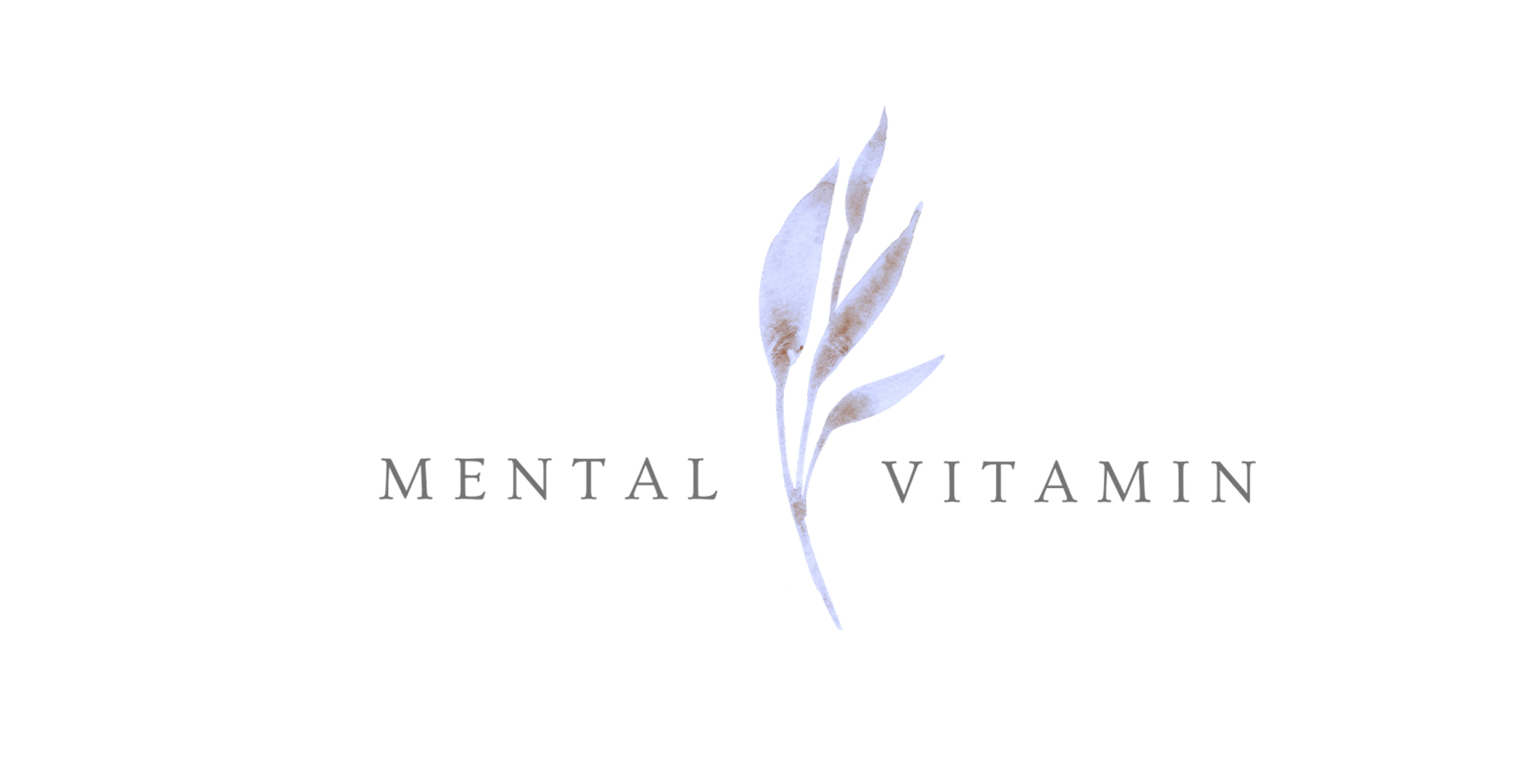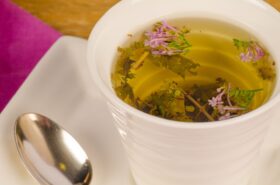Just a friendly heads-up! The information shared in this post is for general knowledge purposes only and should not be considered a substitute for professional medical advice. It’s crucial to talk to a healthcare professional before trying any new supplements. They can provide personalized guidance based on your unique needs and ensure they are safe for you. Remember, your health comes first, so consult with a qualified healthcare provider for the best advice tailored to you.
This article may contain compensated links. Please read Disclaimer for more info. As an Amazon Associate, I earn from qualifying purchases.
Table of Contents
You’re tired of the relentless cycle of SSRIs and mood stabilizers. Weary of the grip of sleeping aids and tranquilizers.
The endless list of side effects and dependence has you seeking an alternative—something rooted in nature.
Ever considered dandelion?
You might wonder: How can this unassuming backyard weed hold the key?
Most likely, you’ve heard of dandelion’s other health merits—its battles against cancer and diabetes. But its potential impact on mental well-being might come as a revelation.
This doesn’t suggest replacing your antidepressants and psychotropic medications. It’s about offering a glimpse of natural support without harsh side effects.
Now, let’s journey into the world of the best dandelion tea. Each sip holds the potential to enhance your well-being in a delightful and impactful way.
Jump to the tea recommendations. Find out where to buy dandelion tea.

Dandelion’s Healing Journey: A Global Perspective
Dandelion, known scientifically as Taraxacum officinale, boasts a rich history that spans the globe.
- Native Americans, with their deep knowledge of nature’s remedies, boiled dandelion into decoctions to combat kidney diseases, skin anomalies, and stomach upsets.
- In traditional Chinese medicine, dandelion was a staple. It was sought after for digestive disorders and conditions like appendicitis, as well as certain breast-related concerns.
- In Europe, herbalists recognized the plant’s potential, integrating it into treatments for issues ranging from fevers and boils to eye conditions and diabetes.
Dandelion’s appeal isn’t limited to medicine. Its leaves, roots, and striking flowers have added flair and flavor to many a dish.
Moreover, dandelion has carved out a niche in the world of herbal teas and supplements. These preparations are used to regulate blood sugar, enhance skin vitality, and support both liver and heart health.
Intrigued by dandelion’s potential?
Join us as we delve deeper into its health advantages, exploring its potential for both physical wellness and mental balance.
Dandelion’s Health Trio: Tapping into Every Part of the Flower
The humble dandelion is a powerhouse of health benefits that span from root to flower.
Packed with vitamins and minerals, dandelion leaves have been a staple in traditional medicine for centuries.
Fresh and zesty, they’re a culinary secret weapon, often used in Mediterranean dishes for their unique, slightly bitter taste.
You’re into herbal teas? Brewing these leaves results in a drink that’s not only refreshing but also known to support kidney function and act as a diuretic.
These bright yellow blooms do more than just beautify a landscape. Rich in antioxidants, dandelion flowers have been used in traditional remedies to combat free radicals.
They’re the backbone of artisanal syrups and jellies, adding a sweet, honey-like flavor.
And for those with a penchant for homebrewing? These flowers can be fermented into dandelion wine, a drink that’s been enjoyed for its taste and potential health benefits for generations.
This is where the plant’s power is highly concentrated. The best dandelion root tea is rich in inulin, a type of soluble fiber, dandelion roots support gut health. When dried and steeped, they produce a tea that’s been linked to liver detoxification.
And for those looking for a caffeine-free coffee alternative? Roasted dandelion roots offer a robust, earthy flavor.
In this post, we’re giving a nod to the entire plant, but our spotlight is firmly on the roots and the leaves.
Their potential is gaining attention in the world of mental health. Emerging research suggests that compounds in both roots and leaves may have a positive impact on mood disorders like depression and anxiety.
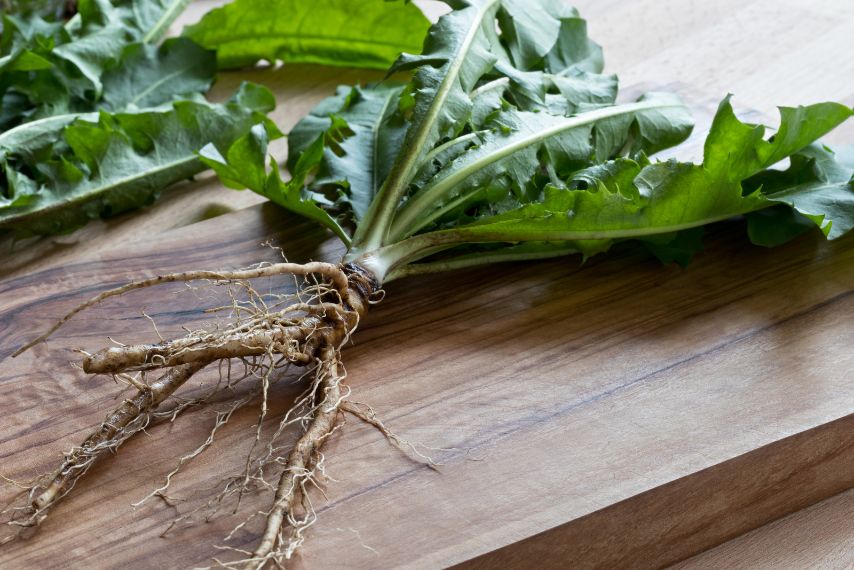
Savoring Dandelion: Different Forms of Consumption
Dandelion offers a variety of consumption methods to suit every preference. Here’s a breakdown:
For a more concentrated essence of dandelion, tinctures are the top choice. These potent liquid extracts are often used for therapeutic treatment. Just a few drops can be added to water or taken sublingually for an efficient dose of dandelion extract benefits.
Dandelion Capsules and Tablets:
For those on the move or those who prefer a no-fuss approach, dandelion capsules and tablets provide an efficient way to reap the plant’s benefits. These supplements are mainly made from dandelion root powder. They fit seamlessly into daily supplement routines, ensuring you don’t miss out on what dandelion has to offer.
Dandelion Topical Applications:
Beyond internal consumption, dandelion has found its way into skincare. Its anti-inflammatory properties make it a valuable ingredient in creams and ointments. Whether you’re looking to soothe irritated skin or achieve a smoother complexion, dandelion-infused products might be your next go-to.
A comforting brew, dandelion tea, whether made from its leaves or roots, is not only a delightful drink but is also believed to aid digestion and detoxification. The slightly bitter leaves or the earthy roots, when steeped, offer a unique flavor profile that many have come to love.
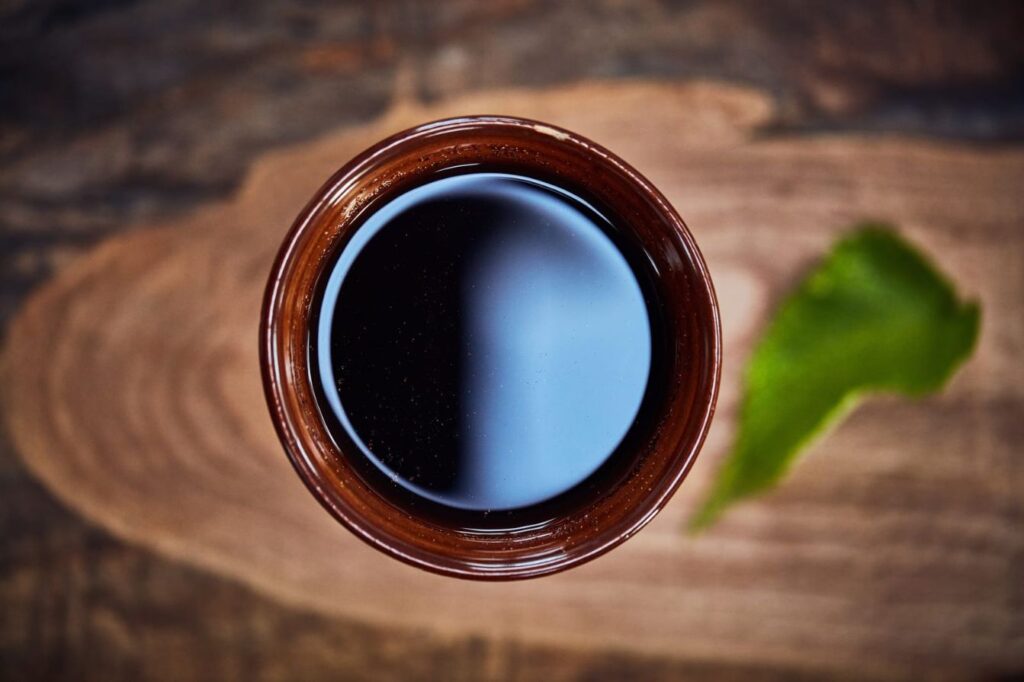
Dandelion Benefits for Overall Well-being
Let’s have a glance at some of the general advantages dandelion can offer for your overall well-being.
Nutritional Powerhouse
Dandelion shines as a nutritional marvel, loaded with essential vitamins, minerals, and dietary fiber. The plant boasts a generous supply of vitamins A, C, and K, along with vitamin E, folate, and key B vitamins. The mineral lineup, encompassing iron, calcium, magnesium, and potassium, contributes to its nutrient prowess.
Harmonizing Blood Sugar
Dandelion’s bioactive compounds, such as chicoric and chlorogenic acids, offer potential for regulating blood sugar levels. Research, primarily conducted on animals and test tubes, suggests that these compounds enhance insulin sensitivity and glucose absorption. However, thorough human trials are required to develop a complete understanding.
Cholesterol and Triglyceride Support
Initial research indicates that dandelion might have a role to play in reducing cholesterol and triglyceride levels, both of which are linked to heart disease risks. The compounds found in dandelion are believed to interact with the body’s metabolism, potentially lowering the levels of these harmful fats.
Balancing Blood Pressure
Dandelion’s diuretic properties and potassium content are helpful for regulating blood pressure and improving cardiovascular health. By promoting the elimination of excess sodium through urine, dandelion may help relax blood vessel walls and maintain a healthy blood pressure range. This, in turn, can support overall heart health and reduce the risk of hypertension-related complications.
Guarding Against Cancer
Test-tube studies highlight dandelion extracts’ potential to inhibit the growth of specific cancer cells. For example, dandelion root extract has been shown to suppress gastric cancer cells’ proliferation and migration. This targeted action against cancer cells without affecting healthy ones opens up exciting possibilities for dandelion’s role in cancer prevention and treatment.
Promoting Digestive Wellness
Dandelion’s rich prebiotic fiber content and influence on stomach contractions position it as a valuable ally for digestive health. Additionally, as a bitter green, dandelion may stimulate bile production, aiding the liver in breaking down fats during digestion. Incorporating dandelion into your diet could not only provide relief from constipation but also enhance the body’s ability to absorb nutrients, supporting a balanced and efficient digestive system.
Preventing Urinary Infections
As a natural diuretic, dandelion helps the body produce more urine and promotes the flushing of the urinary system. This action can help cleanse the urinary tract, making it less inviting for bacteria to grow and cause infections.
Additionally, dandelion contains compounds with potential antimicrobial properties, offering further defense against urinary tract infections (UTIs). It’s important to note, however, that dandelion should complement, not replace, medical treatment, and consulting with a healthcare professional is essential.
Boosting Immune Resilience
Studies suggest that dandelion may have promising antimicrobial and antiviral properties. These attributes could make dandelion a natural ally in boosting the body’s immune resilience. The compounds in dandelion, including various flavonoids and phenolic acids, have been observed to inhibit the growth of certain bacteria and viruses in laboratory settings.
Nurturing Healthy Skin
Dandelion shows promise for safeguarding the skin against sun-induced damage, including UVB, and encouraging cell regeneration. As an antioxidant, it protects the skin from free radicals and signs of aging, and its antibacterial and anti-inflammatory properties may help those with acne-prone skin.
Additionally, scientific studies have found that dandelion leaves and flowers can suppress the formation of reactive oxygen species and reduce the activity of matrix metalloproteinases, contributing to skin health and potentially reducing the appearance of fine lines and wrinkles.
Enhancing Bone Health
Rich in antioxidants like beta carotene and polyphenols, dandelion protects against cellular damage that threatens the bone remodeling process. The essential vitamins and minerals found in dandelion, such as Vitamin A, C, K, iron, calcium, magnesium, and potassium, are foundational for building and maintaining strong bones.
Moreover, dandelion’s anti-inflammatory effects positively impact bone health by reducing inflammation, a factor that can hinder the bone remodeling process.

Unveiling Dandelion Tea’s Mental Health Potential
There is growing evidence to suggest that drinking dandelion tea may have a positive impact on various aspects of mental health. More specifically, research indicates potential benefits if you’re experiencing the following conditions:
- Depression
- Anxiety
- Brain health
- Stress
- Fatigue
So, where is the connection?
Essential Nutrients in Dandelion: Vitamins and Minerals
Many of the vitamins and minerals found in dandelion play a vital role in supporting mental health, contributing to optimal brain function and cognitive well-being.
B Vitamins:
B vitamins in dandelion, especially B6, B9 (folate), and B12, are essential for the proper functioning of the brain. They play a role in producing neurotransmitters, which are chemicals that help brain cells communicate with each other. Deficiencies in these vitamins have been linked to depression and cognitive decline.
Vitamin C:
A powerful antioxidant that helps protect the brain from oxidative stress. It also plays a role in the synthesis of neurotransmitters, which are key to mood regulation.
Vitamin K:
Vital for brain health, Vitamin K is involved in the synthesis of sphingolipids, a class of lipids that is abundant in brain cell membranes. It is also known for its role in reducing inflammation in the brain.
Iron:
Iron is essential for the production of hemoglobin, which carries oxygen to the brain. A lack of iron can lead to fatigue, mental fog, and difficulty concentrating.
Potassium:
Potassium is an essential mineral that helps control fluid balance, nerve signals, and muscle contractions. It plays a role in reducing stress and anxiety by helping to regulate the body’s stress response system.
Magnesium:
Known as the ‘relaxation mineral,’ magnesium plays a critical role in brain function and mood regulation. Low levels of magnesium have been linked to an increased risk of depression.
Zinc:
This mineral is essential for maintaining the health of brain cells. Zinc deficiency has been associated with various neuropsychological conditions, including depression and Alzheimer’s disease.
Calcium:
Calcium is integral for transmitting signals in the brain and is also involved in the release of neurotransmitters, which are essential for communication between nerve cells.
Phosphorus:
Phosphorus helps to build and repair cells and tissues, including those in the brain. and is also involved in converting food into energy.
Omega-3 Fatty Acids:
While not a vitamin or mineral, dandelion leaves contain small amounts of omega-3 fatty acids, which are known to reduce inflammation in the brain and improve cognitive function.
Finding Calm in Dandelion’s Anti-Stress Attributes
Dandelion contains a variety of bioactive compounds that are believed to contribute to its potential stress-reducing effects. Here are some of the key components of dandelion and how they can work against stress.
Flavonoids:
Flavonoids are a group of polyphenolic compounds found in dandelion that have strong antioxidant and anti-inflammatory properties. They help to neutralize free radicals and reduce oxidative stress, which is often elevated during periods of chronic stress.
Triterpenoids:
Triterpenoids are compounds found in dandelion that have demonstrated anti-inflammatory effects. Chronic stress can lead to systemic inflammation, and by reducing this inflammation, triterpenoids may help alleviate some of the physical symptoms of stress.
Phenolic Acids:
Phenolic acids, such as chicoric acid and chlorogenic acid, found in dandelion, are known for their antioxidant properties. These compounds help to protect cells from damage caused by oxidative stress, which is often increased during periods of high emotional stress.
Sesquiterpene Lactones:
Dandelion contains sesquiterpene lactones, such as taraxacin, which have demonstrated anti-inflammatory and antioxidant effects. These compounds may help to reduce inflammation in the body, which is often associated with chronic stress.
While these compounds in dandelion have demonstrated various beneficial effects in isolation, the overall stress-reducing effects of dandelion likely result from the synergistic action of these and other compounds.
Nurturing Balance with Dandelion’s Diuretic Support
Dandelion is often referred to as a natural diuretic, which means it can help the body shed excess water and salt through the urine.
Now, you might be wondering: What does this have to do with mental health? Let’s connect the dots.
First off, reducing excess fluid can help lower blood pressure, which is often raised during times of stress. A more balanced blood pressure can lead to a calmer and more focused state of mind. It’s like taking some of the pressure off your body’s stress response system, allowing it to reset and relax.
Additionally, by promoting the elimination of excess salt and water, dandelion might help regulate electrolytes in the body. Proper electrolyte balance is key for nerve function, including the nerves in our brain. When our electrolytes are in harmony, our brain can send and receive signals more effectively, which is fundamental for clear thinking and emotional stability.
Nourishing the Gut-Brain Axis with Dandelion
Inulin is a type of fiber abundant in dandelion that acts as nourishment for the beneficial bacteria in our gut. By fostering a balanced gut microbiome, inulin plays an essential role in the gut-brain axis, the communication channel between our digestive system and brain.
Inulin’s function in supporting the good bacteria helps maintain this vital connection. Research shows that a well-balanced gut can positively influence the brain, affecting mood, behavior, and even cognitive function. This relationship has been observed in studies where shifts in gut bacteria led to noticeable changes in stress levels and anxiety.
You’ll find a high concentration of inulin in the best dandelion root tea we recommend in our review.
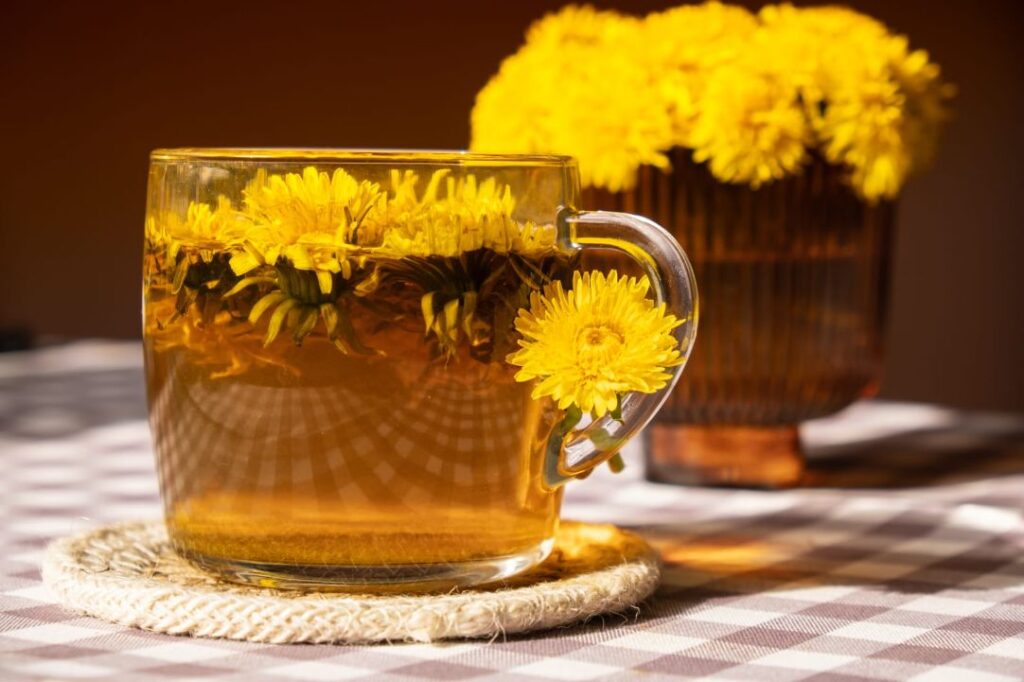
Discovering the Best Dandelion Tea: Our Recommendations
While you can make tea from all parts of the dandelion plant—flowers, leaves, and roots—our focus here is on the root and the leaves, as they contain compounds that are particularly beneficial for mental health.
Top 1: Organic Roasted Dandelion Root Tea by Traditional Medicinals

- Blend and Purpose: We were drawn to Traditional Medicinals Organic Roasted Dandelion Root Tea for its rich, dark flavor. It felt like a delightful morning treat and a great potential coffee alternative. We also appreciated the convenience of tea bags and certifications such as USDA Organic and Gluten-Free.
- Heritage and Values: The tea’s commitment to sustainability is evident in its sourcing from wild meadows in Poland and Bosnia and its careful preparation process. This balance of quality, convenience, and sustainable practices speaks to a product aligned with both modern values and traditional care.
- Flavor Experience: We found the flavor to be mildly earthy and pleasantly savory, with subtle citrus notes and a refreshing hint of spearmint. Paired with cream and honey, it felt like a dessert to start the day! The natural bitterness, intriguing yet known to aid digestion, added a unique dimension.
- Overall: According to our judgment, this is the best dandelion root tea we could find. The unique flavors, potential calming effects during moments of anxiety or stress, and the blend’s alignment with sustainable practices make Traditional Medicinals Organic Roasted Dandelion Root Tea a standout choice. If you’re curious about natural wellness options and open to a different flavor profile, we highly recommend giving it a try.
Top 2: Numi’s Dandelion Detox Tea

- Blend and Purpose: Numi’s new Dandelion Detox Tea is part of their Stay Healthy supplement line. It caught our attention with its unique blend of dandelion root, dandelion leaf, nettle, burdock root, red clover, milk thistle, lemon peel, cardamom, and lemon myrtle. We drank it for three weeks, and some of the results were: clearer skin, an increase in energy, and a more balanced mood. However, the results differed for everyone.
- Heritage and Values: We appreciate that this tea is organic, caffeine-free, and non-GMO Project Verified. Numi’s commitment to social and environmental impact resonates with us, and their dedication to responsible business practices, regenerative organic agriculture, sustainable packaging, fair wages, and social benefits adds to the appeal of the product.
- Flavor Experience: The scent is fresh and earthy, and the flavor herbal with some floral notes. The packaging keeps the tea fresh. However, the taste might not be for everyone. Some of us enjoyed this dandelion tea blend, while others found it a bit too herbal.
- Overall Assessment: From the thoughtful blend of herbs to the company’s commitment to quality and responsibility, Numi’s Dandelion Detox Tea is a product that offers more than just a tasty brew. If you’re looking for a tea that nurtures wellness and aligns with ethical practices, this could be a choice worth exploring.
Top 3: steep by Bigelow Organic Dandelion and Peach with Rooibos and Green Tea

- Blend and Purpose: This tea’s blend of organic dandelion leaves, green tea, rooibos, and peach is crafted for more than just enjoyment; it’s an invitation to relaxation and mindfulness. The combination creates a fine balance that led us to a place of inner tranquility.
- Heritage and Values: Bigelow Tea’s rich history and commitment to quality struck a chord with us. Since 1945, they’ve been hand-picking teas and using real spices, reflecting a dedication to excellence. We appreciated the USDA Organic certification, a testament to their values and a promise of quality.
- Flavor Experience: The flavor of this tea truly rocks! We found the taste gentle yet invigorating—a harmonious blend that doesn’t need sugar or honey to shine. The combination of dandelion, peach, rooibos, and green tea celebrates both the sweet and earthy, offering a taste journey we thoroughly enjoyed.
- Overall: steep by Bigelow’s Organic Dandelion and Peach Tea was a joyful discovery. From its thoughtful blend to its commitment to quality, it’s a tea that offers more than just refreshment. It’s a cup of tranquility, a moment of peace, and a celebration of the simple pleasures of life. Whether for daily enjoyment or a special moment of relaxation, it’s a tea that inspires connection and contentment.
Top 4: Tadin’s Detox Dandelion Tea

- Blend and Purpose: Tadin’s Detox Dandelion Tea is a delicious blend of nature’s gifts like dandelion, hibiscus, and lemongrass. Even if it is primarily crafted for detoxification, we felt a relaxing, calming effect. After all, detox and anxiety are closely linked. It’s a tea that invites you to explore wellness in a cup.
- Heritage and Values: Tadin Herb & Tea’s connection to Latino roots is a celebration of tradition and family values. With over forty years of nurturing well-being through herbal remedies, they’ve created a legacy that we found both respectful and inspiring. Their commitment to quality is a testament to honoring heritage.
- Flavor Experience: This tea offers a medley of flavors, from earthy dandelion to subtle sweetness. We liked that it tasted great even without sugar or honey. It’s a mild but enjoyable experience that we appreciate very much.
- Overall: The blend’s potential wellness benefits, coupled with its mild flavor and careful attention to quality, make it a thoughtful choice for tea enthusiasts. It’s a tea that doesn’t just taste delightful. It gets the detox and calming job done!
Top 5: Farmer Queen Premium Dandelion (Loose Leaves)

- Blend and Purpose: We were drawn to Farmer Queen’s Premium Dandelion Loose Leaves for their purity and medicinal reputation. With extra high contents of linolic acid, beta carotene, and riboflavin, this tea offers potential benefits for your mental and overall well-being.
- Heritage and Values: Farmer Queen’s commitment to 100% natural ingredients, free from additives, preservatives, or artificial colors, resonated with us. The focus on quality and authenticity is evident in every cup.
- Flavor Experience: The flavor of Farmer Queen Premium Dandelion Loose Leaves is light-bodied and herbaceous, with a slightly bitter edge that we found intriguing. This bitterness, a characteristic of dandelion, adds a complexity to the taste that can be balanced with honey if desired.
- Overall: Farmer Queen Premium Dandelion Loose Leaves offers a unique and enjoyable experience. The freshness of the leaves, control over strength and flavor, and the ritual of loose-leaf brewing enhance the pleasure of each cup. With all the great health benefits and the quality leaves, this tea is a standout choice for both morning cleanse and evening relaxation, providing a mindful and nourishing experience.
Top 6: Waitrose Love Life Dandelion, Fennel & Ginger Infusion Tea

- Blend and Purpose: We found the blend of dandelion, fennel, and ginger in this infusion tea to be both pleasant and uplifting. The combination offers potential health benefits with dandelion’s detoxifying properties, fennel’s support for digestion, and ginger’s warming touch. It’s a tea that we found soothing, especially as a gentle start to the day.
- Heritage and Values: Waitrose’s Love Life line impressed us with its commitment to quality and thoughtful blending. The reasonable price and careful selection of ingredients reflect a dedication to well-being that resonated with us. It’s a top dandelion tea that feels crafted with care and attention to the overall experience.
- Flavor Experience: The flavor of this tea was a delightful surprise. The sweet notes of dandelion blended harmoniously with the mellow tones of fennel and the subtle spice of ginger. We found the taste neither too sour nor too spicy, and the absence of bitterness from the dandelion was a pleasant discovery. It’s a unique flavor combination that we thoroughly enjoyed.
- Overall: From its thoughtful blend to its enticing flavor, Waitrose Love Life Dandelion, Fennel & Ginger Infusion Tea is a tea that offers more than just refreshment. It’s a comforting and uplifting experience that we find ourselves returning to again and again. Whether for a morning ritual or a calming afternoon break, it’s a tea that invites contentment and joy.
How to Make Dandelion Tea? Simple Steps to Prepare
You might wonder how to prepare dandelion tea from roots or leaves. Whether you prefer the convenience of tea bags or the personalized touch of loose leaves, the journey begins the same way: with freshly boiled water.
If you’re using tea bags, place one in your favorite cup and let the hot water dance over it. Allow it to steep for about 5 to 10 minutes, and watch as the water transforms into a fragrant infusion. The tea bag offers a quick and easy path to relaxation, with the perfect blend of leaves enclosed in each sachet.
For those who enjoy the ritual of loose leaves, use a tea infuser or a French press, adding one to two teaspoons of the leaves. Pour hot water over them and let the blend steep for up to 10 minutes. The loose leaves allow you to adjust the intensity and savor the unfolding flavors.
The brewing time is your chance to play, creating a milder or more robust flavor, depending on your mood. Some may relish a longer steeping time for a more intense earthy embrace, while others might seek a shorter time for a gentle caress of flavor.
So, how to drink dandelion root tea?
The answer is as unique as your palate. Some savor the earthy richness plain, allowing the natural flavors to shine. Others might enhance their favorite dandelion tea recipe with a touch of honey or lemon, adding a hint of sweetness or zest.
If you’re exploring dandelion root tea as a coffee substitute, consider indulging in a splash of cream, paired with your favorite sweetener. Sipping dandelion tea with milk is a soothing way to prepare for a peaceful night’s sleep. It transforms the humble brew into a luxurious treat, tailored just for you.
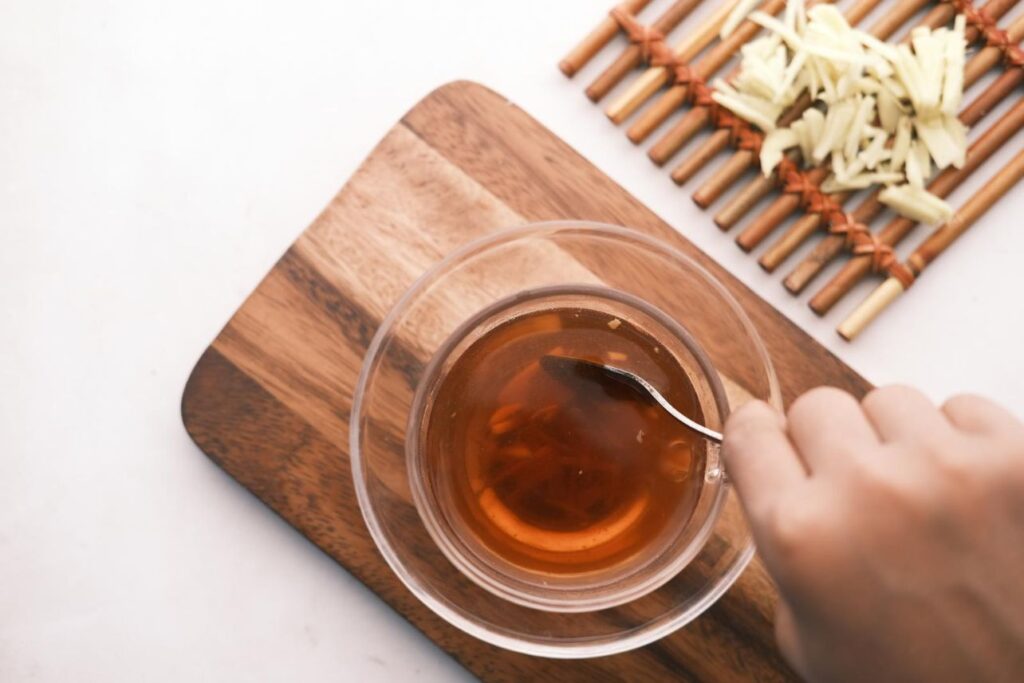
Now, here’s a little heads up:
Navigating Potential Dandelion-Medication Interactions
Since dandelion has properties that might cause it to act like a diuretic, it can speed up the process of drugs exiting your body. Additionally, it can have interactions with various medications, particularly those processed by the liver.
Medications that may interact with dandelion include:
- Antacids: If you take antacids, be aware that dandelion might increase stomach acid, so those antacids might not work as well.
- Blood Thinners: Dandelion could increase the risk of bleeding, especially if you’re on blood thinners like aspirin, warfarin, or clopidogrel.
- Diuretics: Dandelion itself may act like a diuretic, helping your body get rid of extra fluid. If you’re already on water pills, mixing them with dandelion might lead to imbalances in your body.
- Lithium: If you’re using lithium for bipolar disorder, dandelion might worsen its side effects, according to some animal studies.
- Ciproflaxin (Cipro): Some types of dandelion might reduce how much of this antibiotic your body absorbs. It’s not clear if common dandelion would do the same.
- Diabetes Medications: Dandelion might lower blood sugar levels, so if you’re on diabetes meds, adding dandelion might cause your blood sugar to go too low.
Therefore, if you’re on any prescription medications, it’s wise to have a conversation with your healthcare provider before incorporating dandelion into your routine. They’ll know what’s best for your unique situation, and you can enjoy the benefits of dandelion tea without any unexpected surprises.
Embracing Dandelion Tea in Your Daily Ritual
Dandelion tea is more than just a comforting beverage. Not only does it provide a myriad of precious compounds that are beneficial for your physical health. It can also alleviate symptoms of anxiety and depression and bring balance to your daily life.
While it’s not a comprehensive mental health remedy, it can be one sparkling stone in your health mosaic.
We’ve discovered various dandelion teas that cater to different tastes and preferences. Whether you’re drawn to the personalized experience of loose leaf or the harmonious blends with other healthful herbs, there’s a dandelion tea that’s just right for you.
Imagine starting your morning with a cleansing cup or winding down your evening with a relaxing brew. Picture a comforting cup in hand, easing the stresses of the day. That’s the versatility and nourishment that dandelion tea can offer.
Find the blend that resonates with your taste and needs, and let dandelion tea become a cherished part of your self-care routine.

Key Facts and FAQ
What is the best time to drink dandelion tea?
The best time to drink dandelion tea varies based on your goals. For digestive aid, consider having it before meals. If you’re using it to manage stress or anxiety, an evening cup can help you unwind. The tea’s calming effects make it a useful tool in your mental health toolkit.
Is dandelion tea caffeine-free?
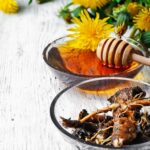
Absolutely, dandelion tea is naturally caffeine-free, making it an excellent choice for individuals seeking to minimize their caffeine consumption. It’s a soothing and caffeine-free alternative to other beverages.
What is the best dandelion tea recipe?
The best dandelion tea recipe is tailored to your specific dandelion tea taste preferences. For a classic, earthy flavor, steep fresh or dried dandelion leaves in hot water for about 10 minutes and add a touch of honey or lemon. If you’re seeking more complexity, consider adding spices like cinnamon or ginger. You can also make it a richer experience by using dandelion root and adding milk or cream, especially if you’re looking for a coffee alternative.
What is the best dandelion tea for acne?
For effective dandelion root tea acne treatment, opt for a blend that focuses on pure dandelion root. The root’s anti-inflammatory qualities can help alleviate acne flare-ups. Additionally, dandelion acts as an antibacterial and anti-fungal agent, cleansing your pores and preventing future breakouts. Its ability to combat microbial infections makes it a potent ingredient for acne management.
Which dandelion tea is best for detox?

For detox, focus on dandelion teas that include a blend of root, leaves, and supportive herbs like milk thistle. These ingredients work together to enhance liver function, a key factor in detoxification. Studies confirm that dandelion tea can effectively remove toxins from the liver and reduce the risk of liver disease. This makes it a solid choice for those looking to naturally cleanse their body.
How to harvest dandelion for tea?
To harvest dandelion for tea, find a clean area that’s free from pesticides. Pick the leaves early in the day when they’re at their freshest, or carefully dig up the roots. After collecting, wash them well and pat them dry. You can either use them right away in your tea or dry them for longer-term storage and future use.
How to make dandelion tea from fresh leaves?
To make dandelion tea from fresh leaves, start by washing the leaves thoroughly. Place them in a teapot or cup and pour hot water over them. Let the leaves steep for about 5-10 minutes, depending on how strong you want the flavor to be. Straining the leaves is the final step before you can savor the vibrant, fresh taste of your homemade dandelion tea.
How to make dandelion tea from roots?
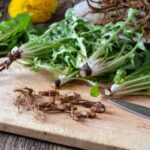
To make dandelion tea from scratch, begin by harvesting roots from a pesticide-free area, ideally from your own back yard. After washing away any soil, chop the roots into small pieces. Place these in a pot of boiling water and let them simmer for 10-15 minutes. This process extracts both the flavor and beneficial nutrients. Once done, strain the liquid into your cup, leaving the root pieces behind. Now, your nutrient-rich dandelion root tea is ready to enjoy.
Does dandelion tea taste bitter?
Dandelion tea does possess a mild bitterness, particularly when prepared from leaves or roots. Nonetheless, various blends and preparations can offer nuanced and milder flavors, enhancing your overall tea experience.
How to drink dandelion tea?
To drink dandelion tea, you can start with the basic brew made from either the leaves or the roots. If you prefer a sweeter taste, add a spoonful of honey. For those who like a tangy twist, a splash of lemon juice works well. If you’re looking to replace your morning coffee, consider adding a dash of milk or cream. The tea is versatile, allowing you to adjust ingredients to meet your specific health goals or flavor preferences.
How to use dandelion tea?
To maximize the dandelion uses and benefits, consider your specific health goals. If you’re looking to improve digestion, a cup before meals can stimulate digestive enzymes. For stress relief, sipping on dandelion tea in the evening can help you unwind. Additionally, it can be used as a skin tonic due to its anti-inflammatory properties. Knowing your objectives will help you integrate dandelion tea effectively into your wellness regimen.
What are some dandelion root extract benefits?
Dandelion root extract is a wellness powerhouse, offering a range of dandelion herbs benefits. From liver support and anti-inflammatory properties to aiding in digestion and potentially reducing cholesterol levels, this extract provides targeted health advantages.
How is dandelion root oil used?
Dandelion oil benefits span a wide array of uses, from skincare to massage therapy. It’s a frequent ingredient in moisturizers and serums, thanks to its anti-inflammatory and hydrating properties. The oil is also a popular choice for massage, providing muscle relaxation and potential relief from joint discomfort.
How to dry dandelion for tea?
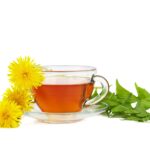
To dry dandelion for tea, particularly dandelion flower tea and dandelion petal tea, simply harvest the flowers or leaves and let them air-dry in a cool, dark space. This process preserves the dandelion flower nutrition, so you can enjoy a nutrient-rich cup any time of the year.
What are some dandelion flower benefits and how to use them?
Dandelion flower benefits are numerous, and dandelion is good for various health and wellness applications. From teas to salads, the flowers offer a unique flavor and nutritional boost. They’re rich in antioxidants and vitamins, providing a natural way to enhance your diet and well-being.
What are the health benefits of dandelion greens?
The health benefits of dandelion greens include support for digestion, detoxification, and overall nutritional wellness. Rich in vitamins and minerals, dandelion greens are a nutritious addition to salads, smoothies, and teas.
What is dandelion sun tea?
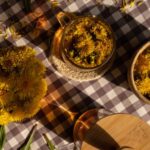
For a dandelion tea homemade experience, you can make dandelion sun tea by placing fresh or dried dandelion leaves or flowers in a jar of water. Let the jar sit in the sun for a few hours to naturally infuse the water. This method offers a unique way to make dandelion tea, capturing the essence of the sun in each sip.
What are the benefits of dandelion tea for menstruation?
Dandelion tea offers relief during menstruation by reducing bloating and easing discomfort, thanks to its natural diuretic and anti-inflammatory properties. Incorporating dandelion tea with lemon can further amplify these benefits, as lemon adds vitamin C and enhances flavor. Vitamin C is particularly beneficial during menstruation as it helps regulate blood loss and aids in iron absorption, reducing the risk of anemia.
What’s the best dandelion tea latte recipe?
For a delightful dandelion root latte, combine brewed dandelion tea with steamed milk and a touch of sweetener. It’s a comforting dandelion tea DIY option that offers a coffee-like experience without the caffeine. Experimenting with different milks and sweeteners can lead to your perfect latte.
Dandelion root tea and pregnancy — Are there any precautions?
When considering dandelion root tea during pregnancy, it’s essential to consult with a healthcare provider. While dandelion root nutrition facts highlight its benefits, it’s essential to understand how the tea may interact with your individual health needs during pregnancy. It’s a natural option but should be used with care during pregnancy.
Dandelion tea for gallbladder relief—Is there any evidence?
Some studies suggest that dandelion may offer gallbladder relief due to its diuretic properties. These dandelion supplement benefits might aid in bile flow and support gallbladder function. However, more research is needed, and individual experiences may vary.
Can you drink dandelion tea for weight loss?
Yes, you can drink dandelion tea for weight loss. What’s the best dandelion tea weight loss recipe? A simple blend of dandelion leaves or roots with a touch of lemon or honey can be a supportive part of your strategy. You can also consider exploring dandelion drops for weight loss. It’s a natural and gentle way to support your weight management.
Can you take dandelion root for water retention?
Dandelion root is often used for water retention due to its natural diuretic properties—one of the major reasons why dandelion is good for you. Compounds like taraxasterol help the kidneys flush out excess water and sodium. Always consult a healthcare provider for tailored advice.
Dandelion root vs. leaf. What is better?
Choosing between dandelion root and leaf depends on your needs and preferences. The root is often used for liver support. It stimulates appetite and helps with liver and gallbladder problems.
Dandelion tea for constipation. Does it work?
Dandelion tea may aid in relieving mild digestive symptoms like bloating and occasional constipation. By stimulating the liver to produce bile, it indirectly supports digestive regularity. Additionally, its diuretic properties can add more water to the digestive system and stools, aiding in smoother bowel movements.
What are some dandelion green tea benefits?
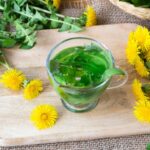
When combined with traditional green tea, dandelion adds a unique flavor and enhances the nutritional profile. The synergy between the components of green tea and dandelion offers additional advantages, such as high polyphenol levels for antioxidants, improved cognitive function, boosted metabolism, lower cholesterol, and enhanced insulin sensitivity.
What are some dandelion root powder benefits?
Dandelion root powder benefits are similar to those of the whole root, including support for liver health, digestion, and potential anti-inflammatory properties. The powdered form allows for versatile use in teas, smoothies, and cooking. It’s a convenient way to enjoy the benefits of dandelion.
When to drink dandelion tea?
Dandelion tea can also be a refreshing morning beverage to kickstart your day. Some individuals find it beneficial to have a cup in the afternoon to curb cravings and promote hydration. Ultimately, the timing depends on your goals, whether it’s supporting digestion, staying hydrated, or simply enjoying its taste. Experiment with different times and see what works best for you.
Sources
Bokelmann JM. Dandelion (Taraxacum officinale). Elsevier eBooks. Published online January 1, 2022:303-307. doi:https://doi.org/10.1016/b978-0-323-84676-9.00039-8.
Hu C. Taraxacum: Phytochemistry and health benefits. Chinese Herbal Medicines. 2018;10(4):353-361. doi:https://doi.org/10.1016/j.chmed.2018.08.003.
Lis B, Olas B. Pro-health activity of dandelion (Taraxacum officinale L.) and its food products – history and present. Journal of Functional Foods. 2019;59:40-48. doi:https://doi.org/10.1016/j.jff.2019.05.012.
Olas B. New Perspectives on the Effect of Dandelion, Its Food Products and Other Preparations on the Cardiovascular System and Its Diseases. Nutrients. 2022;14(7):1350-1350. doi:https://doi.org/10.3390/nu14071350.
Huang S, Meng N, Liu Z, et al. Neuroprotective Effects of Taraxacum officinale Wigg. Extract on Glutamate-Induced Oxidative Stress in HT22 Cells via HO-1/Nrf2 Pathways. Nutrients. 2018;10(7):926-926. doi:https://doi.org/10.3390/nu10070926
Lee B, Lee JH, An HJ. Effects of Taraxacum officinale on Fatigue and Immunological Parameters in Mice. Molecules. 2012;17(11):13253-13265. doi:https://doi.org/10.3390/molecules171113253.
The chemical composition and antioxidant properties of common dandelion leaves compared with sea buckthorn. Canadian Journal of Plant Science. Published 2017. Accessed August 26, 2023. https://cdnsciencepub.com/doi/10.1139/cjps-2016-0409.
González-Castejón M, Visioli F, Arantxa Rodríguez-Casado. Diverse biological activities of dandelion. Nutrition Reviews. 2012;70(9):534-547. doi:https://doi.org/10.1111/j.1753-4887.2012.00509.
Małgorzata Kania-Dobrowolska, Baraniak J. Dandelion (Taraxacum officinale L.) as a Source of Biologically Active Compounds Supporting the Therapy of Co-Existing Diseases in Metabolic Syndrome. Foods. 2022;11(18):2858-2858. doi:https://doi.org/10.3390/foods11182858.
Liu Y, Shen J, Li Y, Huang Q. Antidepressant effects of the water extract fromTaraxacum officinaleleaves and roots in mice. Pharmaceutical Biology. 2014;52(8):1028-1032. doi:https://doi.org/10.3109/13880209.2013.876432.
Gerbino A, Russo D, Colella M, et al. Dandelion Root Extract Induces Intracellular Ca2+ Increases in HEK293 Cells. International Journal of Molecular Sciences. 2018;19(4):1112-1112. doi:https://doi.org/10.3390/ijms19041112.
Research Breakdown on Dandelion – Examine. Examine.com. Published 2022. Accessed August 26, 2023.
Li Y, Chen Y, Dongxiao Sun-Waterhouse. The potential of dandelion in the fight against gastrointestinal diseases: A review. Journal of Ethnopharmacology. 2022;293:115272-115272. doi:https://doi.org/10.1016/j.jep.2022.115272.
Rasool S, Sharma B. Taraxacum Officinale: A High Value Less Known Medicinal Plant. Accessed August 26, 2023. https://citeseerx.ist.psu.edu/viewdoc/download?doi=10.1.1.673.6393&rep=rep1&type=pdf.
Black HS, Boehm F, Edge R, T. George Truscott. The Benefits and Risks of Certain Dietary Carotenoids that Exhibit both Anti- and Pro-Oxidative Mechanisms—A Comprehensive Review. Antioxidants. 2020;9(3):264-264. doi:https://doi.org/10.3390/antiox9030264.
Agnese Di Napoli, Pietro Zucchetti. A comprehensive review of the benefits of Taraxacum officinale on human health. Bulletin of the National Research Centre. 2021;45(1). doi:https://doi.org/10.1186/s42269-021-00567-1.
Belén García-Carrasco, Fernandez-Dacosta R, Dávalos A, Ordovas JM, Arantxa Rodríguez-Casado. In vitro Hypolipidemic and Antioxidant Effects of Leaf and Root Extracts of Taraxacum Officinale. Medical Sciences. 2015;3(2):38-54. doi:https://doi.org/10.3390/medsci3020038.
Wirngo FE, Norman M, Per Bendix Jeppesen. The Physiological Effects of Dandelion (Taraxacum Officinale) in Type 2 Diabetes. The review of diabetic studies. 2016;13(2-3):113-131. doi:https://doi.org/10.1900/rds.2016.13.113.
Chung Mu Park, Chung Won Cho, Young Sun Song. TOP 1 and 2, polysaccharides from Taraxacum officinale, inhibit NFκB-mediated inflammation and accelerate Nrf2-induced antioxidative potential through the modulation of PI3K-Akt signaling pathway in RAW 264.7 cells. Food and Chemical Toxicology. 2014;66:56-64. doi:https://doi.org/10.1016/j.fct.2014.01.019.
Aristea Binia, Jaeger J, Hu Y, Singh A, Zimmermann D. Daily potassium intake and sodium-to-potassium ratio in the reduction of blood pressure. Journal of Hypertension. 2015;33(8):1509-1520. doi:https://doi.org/10.1097/hjh.0000000000000611.
Rehman G, Muhammad Hamayun, Iqbal A, et al. Effect of Methanolic Extract of Dandelion Roots on Cancer Cell Lines and AMP-Activated Protein Kinase Pathway. Frontiers in Pharmacology. 2017;8. doi:https://doi.org/10.3389/fphar.2017.00875.
Jin YX, Jin JG, Piao X, Jin N. The effect of Taraxacum officinale on gastric emptying and smooth muscle motility in Rodents. Neurogastroenterology and Motility. 2011;23(8):766-e333. doi:https://doi.org/10.1111/j.1365-2982.2011.01704.x.
Yang Y, Li S. Dandelion Extracts Protect Human Skin Fibroblasts from UVB Damage and Cellular Senescence. Oxidative Medicine and Cellular Longevity. 2015;2015:1-10. doi:https://doi.org/10.1155/2015/619560.
Gao C, Kong S, Guo B, Liang X, Duan H, Li D. Antidepressive Effects of Taraxacum Officinale in a Mouse Model of Depression Are Due to Inhibition of Corticosterone Levels and Modulation of Mitogen-Activated Protein Kinase Phosphatase-1 (Mkp-1) and Brain-Derived Neurotrophic Factor (Bdnf) Expression. Med Sci Monit. 2019 Jan 13;25:389-394. doi: 10.12659/MSM.912922. PMID: 30636257; PMCID: PMC6340315.
Marwan Sofyan, Dewi Yunia Fitriani, Dewi Friska, Ray Wagiu Basrowi, Fuady A. B Vitamins, work‐related stress and emotional mental disorders: a cross‐sectional study among nurses in Indonesia. Nursing open. Published online April 17, 2022. doi:https://doi.org/10.1002/nop2.1213.
Plevin D, Galletly C. The neuropsychiatric effects of vitamin C deficiency: a systematic review. BMC Psychiatry. 2020;20(1). doi:https://doi.org/10.1186/s12888-020-02730-w.
Bolzetta F, Veronese N, Stubbs B, et al. The Relationship between Dietary Vitamin K and Depressive Symptoms in Late Adulthood: A Cross-Sectional Analysis from a Large Cohort Study. Nutrients. 2019;11(4):787-787. doi:https://doi.org/10.3390/nu11040787.
Lee HS, Chao HH, Huang WT, Solomon Chih-Cheng Chen, Yang HY. Psychiatric disorders risk in patients with iron deficiency anemia and association with iron supplementation medications: a nationwide database analysis. BMC Psychiatry. 2020;20(1). doi:https://doi.org/10.1186/s12888-020-02621-0.
Arab A, Zabibah RS, Shadia Hamoud Alshahrani, Karimi E, Askari G, Fariborz Khorvash. Is there a relationship between 24-hour urinary sodium and potassium and mental health in migraine patients?: A cross-sectional study. Medicine. 2022;101(42):e31037-e31037. doi:https://doi.org/10.1097/md.0000000000031037.
A. Botturi, Ciappolino V, Delvecchio G, Boscutti A, Viscardi B, Brambilla P. The Role and the Effect of Magnesium in Mental Disorders: A Systematic Review. Nutrients. 2020;12(6):1661-1661. doi:https://doi.org/10.3390/nu12061661.
Ole Kristian Grønli, Kvamme JM, Oddgeir Friborg, Wynn R. Zinc Deficiency Is Common in Several Psychiatric Disorders. PLOS ONE. 2013;8(12):e82793-e82793. doi:https://doi.org/10.1371/journal.pone.0082793.
Shen X, Gu X, Liu YY, Yang L, Zheng M, Jiang L. Association between dietary calcium and depression among American adults: National health and nutrition examination survey. Frontiers in Nutrition. 2023;10. doi:https://doi.org/10.3389/fnut.2023.1042522.
Merita Rroji, Andreja Figurek, Viggiano D, Capasso G, Goce Spasovski. Phosphate in the Context of Cognitive Impairment and Other Neurological Disorders Occurrence in Chronic Kidney Disease. International Journal of Molecular Sciences. 2022;23(13):7362-7362. doi:https://doi.org/10.3390/ijms23137362.
Lange KW. Omega-3 fatty acids and mental health. Global health journal. 2020;4(1):18-30. doi:https://doi.org/10.1016/j.glohj.2020.01.004.
WebMD Editorial Contributors. What to Know About Vitamins and Mental Health. WebMD. Published March 26, 2021. Accessed August 26, 2023. https://www.webmd.com/vitamins-and-supplements/what-to-know-about-vitamins-and-mental-health.
Jiao F, Tan Z, Yu Z, Zhou B, Meng L, Shi X. The phytochemical and pharmacological profile of taraxasterol. Front Pharmacol. 2022 Aug 4;13:927365. doi: 10.3389/fphar.2022.927365. PMID: 35991893; PMCID: PMC9386448.
Choi UK, Lee OH, Yim JH, Cho CW, Rhee YK, Lim SI, Kim YC. Hypolipidemic and antioxidant effects of dandelion (Taraxacum officinale) root and leaf on cholesterol-fed rabbits. Int J Mol Sci. 2010 Jan 6;11(1):67-78. doi: 10.3390/ijms11010067. PMID: 20162002; PMCID: PMC2820990.
Jeon HJ, Kang HJ, Jung HJ, Kang YS, Lim CJ, Kim YM, Park EH. Anti-inflammatory activity of Taraxacum officinale. J Ethnopharmacol. 2008 Jan 4;115(1):82-8.
Qian L, Zhou Y, Teng Z, Du CL, Tian C. Preparation and antibacterial activity of oligosaccharides derived from dandelion. Int J Biol Macromol. 2014 Mar;64:392-4. doi: 10.1016/j.ijbiomac.2013.12.031. Epub 2013 Dec 22. PMID: 24368113.
Zhu H, Zhao H, Zhang L, et al. Dandelion root extract suppressed gastric cancer cells proliferation and migration through targeting lncRNA-CCAT1. Biomedicine & Pharmacotherapy. 2017;93:1010-1017. doi:https://doi.org/10.1016/j.biopha.2017.07.007.
DeLoach T, Beall J. Diuretics: A possible keystone in upholding cognitive health. The mental health clinician. 2018;8(1):33-40. doi:https://doi.org/10.9740/mhc.2018.01.033.
Sevil Yasar, Fu Mei Lin, Fried LP, et al. Diuretic use is associated with better learning and memory in older adults in the Ginkgo Evaluation of Memory study. Alzheimers & Dementia. 2012;8(3):188-195. doi:https://doi.org/10.1016/j.jalz.2011.03.010.
Diuretics and Cognitive Health. AlzheimersDisease.net. Published 2022. Accessed August 26, 2023. https://alzheimersdisease.net/research-studies/diuretics-and-cognitive-health.
Hoffman JD, Yanckello LM, Chlipala GE, et al. Dietary inulin alters the gut microbiome, enhances systemic metabolism and reduces neuroinflammation in an APOE4 mouse model. PLOS ONE. 2019;14(8):e0221828-e0221828. doi:https://doi.org/10.1371/journal.pone.0221828.
Clapp M, Aurora N, Herrera L, Bhatia M, Wilen E, Wakefield S. Gut Microbiota’s Effect on Mental Health: The Gut-Brain Axis. Clinics and practice. 2017;7(4):987-987. doi:https://doi.org/10.4081/cp.2017.987.
Associations between mental health and blood pressure. Www.mpg.de. Published 2023. Accessed August 26, 2023. https://www.mpg.de/20163652/0413-nepf-how-high-blood-pressure-affects-mental-health.
Drugscom. Dandelion Uses, Side Effects & Warnings. Drugs.com. Published 2023. Accessed August 26, 2023. https://www.drugs.com/mtm/dandelion.html.
